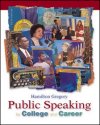Devising a research strategy can help you find materials efficiently. Start
early and follow your plan systematically. Use your specific purpose statement
as a guide. If necessary, get help from librarians and use inter-library loan. Use the Internet to find information quickly. The parts of the Internet
that are especially useful are Websites, expert sites, and discussion forums.
To find data, use subject directories for a broad view and search engines for
specific queries. When using a search engine, employ plus signs in front of
several keywords so that you get a manageable, high-quality list of results. Don't overlook traditional library resources, such as books and articles.
Most libraries have computerized indexes to more articles than can be accessed
on the Internet. Libraries are also superior to the Internet in the area of
reference materials, which are unsurpassed for depth, detail, and reliability. There are some other valuable resources that are often overlooked: graphics
and audiovisuals, television reports, personal experiences and observations,
and community and out-of-town resources. Interviewing knowledgeable people on your campus or in your community can
yield up-to-date information in many fields. To prepare for an interview, do
extensive research on the topic and then draw up a list of questions to be asked.
Conduct the interview in a relaxed, conversational manner. You also can conduct
interviews via e-mail on a computer. To record information effectively, use stick-on slips, index cards, or
a computer. On all notes of key ideas, put a subject heading at the top, and
have only one idea per note. These notes can later be arranged systematically
as you organize and outline your material. | 


 2002 McGraw-Hill Higher Education
2002 McGraw-Hill Higher Education